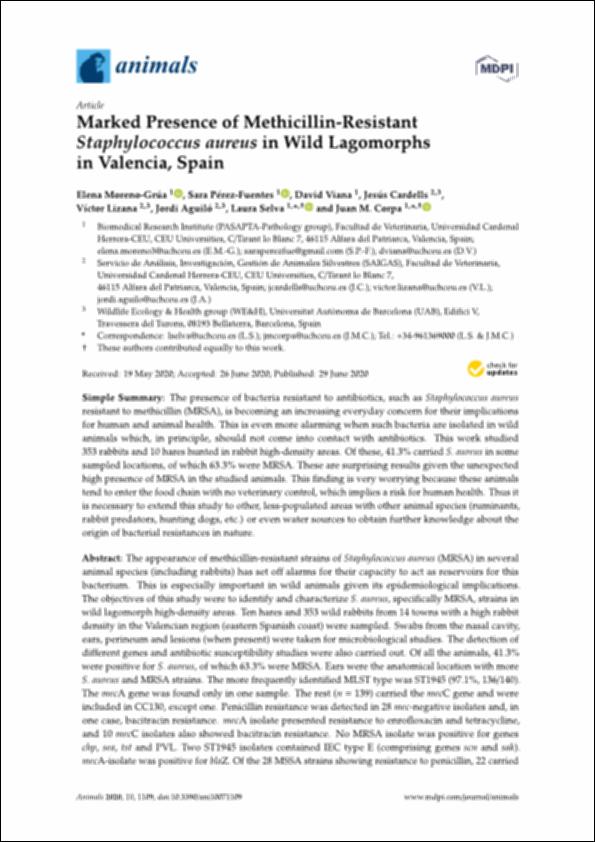Por favor, use este identificador para citar o enlazar este ítem:
http://hdl.handle.net/10637/12503Marked presence of methicillin-resistant "Staphylococcus aureus" in wild lagomorphs in Valencia, Spain
| Título : | Marked presence of methicillin-resistant "Staphylococcus aureus" in wild lagomorphs in Valencia, Spain |
| Autor : | Moreno Grúa, Elena Pérez Fuentes, Sara Viana Martín, David Cardells Peris, Jesús Lizana Martín, Víctor Manuel Aguiló Gisbert, Jordi Selva Martínez, Laura Corpa Arenas, Juan Manuel |
| Materias: | Conejos - Bacteriología - España - Comunidad Valenciana.; Cunicultura.; Rabbits - Bacteriology - Spain - Valencia (Autonomous Community); Estafilococos - Resistencia a los medicamentos.; Staphylococcus - Drug resistance.; Rabbits - Breeding. |
| Editorial : | MDPI |
| Citación : | Moreno-Grúa, E., Pérez-Fuentes, S., Viana, D., Cardells, J., Lizana, V., Aguiló, J., et al. (2020). Marked presence of Methicillin-resistant Staphylococcus aureus in wild lagomorphs in Valencia, Spain. Animals, vol. 10, i. 7 (29 jun.), art. 1109. DOI: https://doi.org/10.3390/ani10071109 |
| Resumen : | The appearance of methicillin-resistant strains of Staphylococcus aureus (MRSA) in several animal species (including rabbits) has set o alarms for their capacity to act as reservoirs for this bacterium. This is especially important in wild animals given its epidemiological implications. The objectives of this study were to identify and characterize S. aureus, specifically MRSA, strains in wild lagomorph high-density areas. Ten hares and 353 wild rabbits from 14 towns with a high rabbit density in the Valencian region (eastern Spanish coast) were sampled. Swabs from the nasal cavity, ears, perineum and lesions (when present) were taken for microbiological studies. The detection of di erent genes and antibiotic susceptibility studies were also carried out. Of all the animals, 41.3% were positive for S. aureus, of which 63.3% were MRSA. Ears were the anatomical location with more S. aureus and MRSA strains. The more frequently identified MLST type was ST1945 (97.1%, 136/140). The mecA gene was found only in one sample. The rest (n = 139) carried the mecC gene and were included in CC130, except one. Penicillin resistance was detected in 28 mec-negative isolates and, in one case, bacitracin resistance. mecA isolate presented resistance to enrofloxacin and tetracycline, and 10 mecC isolates also showed bacitracin resistance. No MRSA isolate was positive for genes chp, sea, tst and PVL. Two ST1945 isolates contained IEC type E (comprising genes scn and sak). mecA-isolate was positive for blaZ. Of the 28 MSSA strains showing resistance to penicillin, 22 carried the blaZ gene. These surprising results highlight the marked presence of MRSA strains in wild rabbits in high-density areas. |
| Descripción : | Este artículo se encuentra disponible en la siguiente URL: https://www.mdpi.com/2076-2615/10/7/1109 Este artículo pertenece al número especial "Disease and immunology of rabbits". |
| URI : | http://hdl.handle.net/10637/12503 |
| Derechos: | http://creativecommons.org/licenses/by/4.0/deed.es |
| ISSN : | 2076-2615 (Electrónico). |
| Fecha de publicación : | 29-jun-2020 |
| Centro : | Universidad Cardenal Herrera-CEU |
| Aparece en las colecciones: | Dpto. Producción y Sanidad Animal, Salud Pública Veterinaria y Ciencia y Tecnología de los Alimentos |
Los ítems de DSpace están protegidos por copyright, con todos los derechos reservados, a menos que se indique lo contrario.


